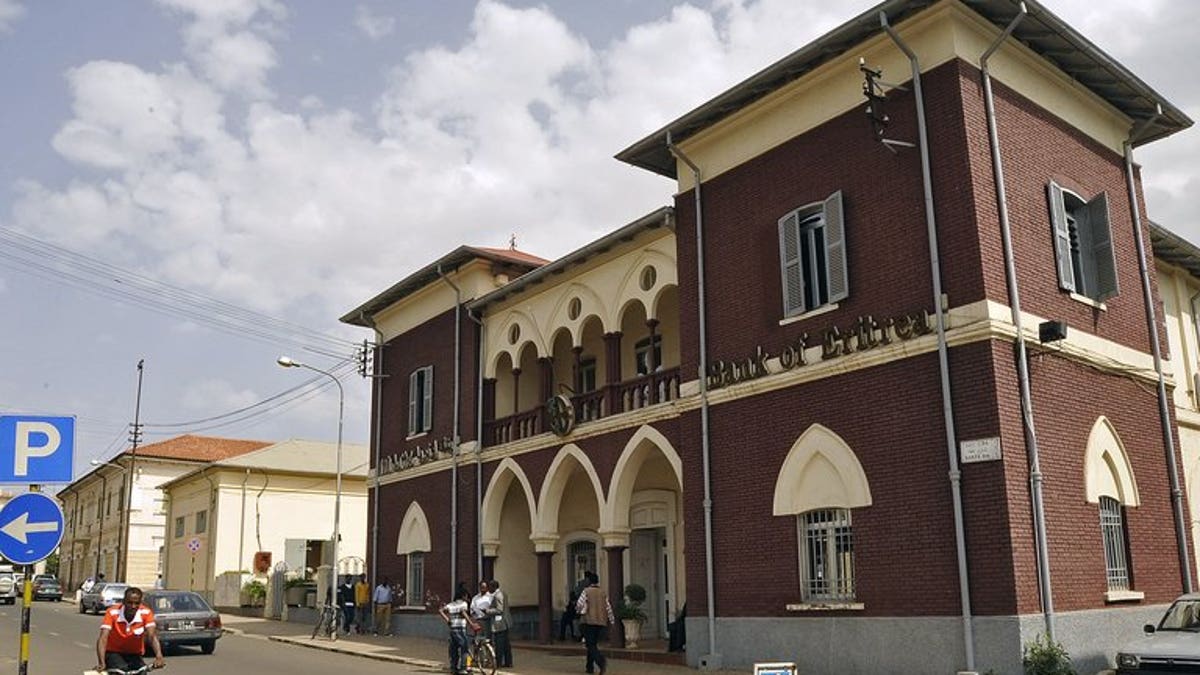
A photo taken on July 22, 2013 shows the Bank of Eritrea in Asmara. Long criticised for backing rebel groups across the Horn of Africa, Eritrea has said that ending its isolation is crucial for economic growth, blaming external threats for its slow development. (AFP/File)
ASMARA, Eritrea (AFP) – Long criticised for backing rebel groups across the Horn of Africa, Eritrea has said that ending its isolation is crucial for economic growth, blaming external threats for its slow development.
"We cannot live in isolation, because at the end of the day we can only prosper if there is an environment for trade between neighbouring countries," Yemane Gebremeskel, director of the president's office, told AFP in a rare interview with a foreign journalist in the country's capital, Asmara.
Trade and investment slumped in the years following the bitter 1998-2000 border war with arch-foe Ethiopia, and stagnated under a policy of fierce self-reliance.
But today, there are signs Eritrea is warming to foreign investors, especially in the mining industry with more than a dozen companies, including from China, Canada and Australia, exploring the mineral-rich country.
But relations with neighbours remain tense.
Eritrea and Ethiopia have long traded accusations of backing rebels to needle each other, with their troops still eying each other along the fortified frontier more than a decade after their border war ended.
The two countries remain at odds over the flashpoint town of Badme, awarded to Eritrea by a United Nations-backed boundary commission but still controlled by Ethiopia.
"We would not like to have a divided attention, a divided focus, we would not like to devote time and energy to defence... but the external environment has not been very helpful," Yemane said.
Relations with Djibouti are frozen after border skirmishes in 2008, while regionally Eritrea stands almost alone, after pulling out of the Intergovernmental Authority on Development (IGAD), the main east African bloc.
The UN accuses Eritrea of destabilising the region by supporting rebel groups in neighbouring Ethiopia and Somalia, including the Al-Qaeda linked Shebab fighters in Somalia, claims Yemane dismissed as lies.
But Sudan -- where Eritrea once backed anti-government rebels from Darfur, the south and the east -- is now warming relations with Asmara, although close friendship with Sudan's President Omar al-Bashir, who faces genocide charges at the International Criminal Court, brings with it diplomatic challenges too.
But despite Yemane's optimistic rhetoric, Eritrea remains focused on building its defence from external threats, while some critics would say it is also building up strength against internal threats too.
Elections have been stalled, the constitution not implemented, and the country's youth are conscripted into years of national service, a nation-building programme introduced after Eritrea broke free from Ethiopia in 1991 after a bloody 30-year war.
"If it (elections) has been postponed, it has been postponed depending on the threats we face, real or perceived," he added.
Officially, national service lasts no more than 18 months, but many report being locked into the programme -- into the armed forces or civil service -- for more than a decade on a meagre salary.
"The national service has been prolonged because of the war and because the state of the situation," Yemane said.
Each month, thousands of young Eritreans flee the country into neighbouring Ethiopia and Sudan as refugees, according to the UN refugee agency.
Yemane however insists "it is not a big issue."
Until Eritreans are officially released from the programme, they are restricted from travelling outside the country, and in Asmara's airport, travellers are screened for release papers before flying.
Accusations of flouting democratic ideals and muzzling the media and opposition are common from rights groups and the international community.
But Yemane insists that his country is unfairly judged and is often examined in a vacuum, without considering the wider context shaping Eritrea's politics.
"You can take a snapshot, you can have a checklist, you can say 'OK, the press is owned by the government, there is no political opposition,' you can reach that kind of simplistic conclusion," he said.
"Or you can look at the complexity of issues, the trajectory we have gone, the problems we are facing, the external threats we are facing."
